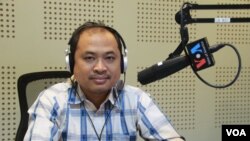Long before he was sued by Prime Minister Hun Sen and jailed in Phnom Penh’s notorious Prey Sar prison, Kim Sok’s mother told him to keep his head down.
“I told him not to try and be like Kem Ley,” Chou Sami, 55, said of Sok’s colleague, an outspoken government critic who was gunned down in July in what many believe was a political assassination.
Sami said she told her son she was afraid for his safety. “I’m scared. If there’s any danger, I don’t know how I can help you,” she recalls telling Sok.
“Don’t worry mom,” Sok reportedly replied.
On February 17, Sok was charged with defamation and incitement and then jailed. He had spoken publicly about the killing of Ley, allegedly accusing Hun Sen of involvement.
If found guilty, he could face up to two years in jail. Hun Sen demanded $500,000 in compensation.
Sok’s transformation from a government advisor to a controversial political activist and commentator in the past several months came as a surprise to his family.
Born in Beng in Takeo province’s Koh Andeth district, the 37 year old was the eldest of five children. Sami remembers him as a gentle boy who helped her in the rice fields, later excelling at mathematics in high school.
“When Sok was young, he studied very hard. My son took books with him whenever he went to tend the cows,” Sami said. “I was poor and could not support his studies properly. But he tried to study himself.”
Sami recalls that his classmates in grade 11 once asked him to teach them math instead of the teacher.
Kim Seng, Sok’s brother, said Sok was never a natural political activist, but his life changed when he moved to Phnom Penh in 1998. He lived at a pagoda until 2000, when he was awarded a scholarship to study math at the Royal University of Phnom Penh.
He had joined the Royalist Funcinpec party, led by Prince Norodom Ranariddh, in 1999, and by 2002 he had risen to a position in the prince’s cabinet. He left politics in 2008 to focus on social issues, working for a number of NGOs.
Seng said that after several years of asking his brother to leave Funcinpec and live a “normal life”, Sok relented, left the party, got married, had a daughter and opened a small gold business in Takeo.
He has since separated from his wife, his family says, but has not formally divorced her.
Shortly after the marriage, Sok won another scholarship, this time to pursue a business degree in China. He returned to Cambodian in 2015.
After he came back from China, he started up another business, Seng said, this time selling paint.
It wasn’t until the separation that he turned to activism, Seng added.
Sok joined the political discussion group Politikoffee and began to be invited to appear on the radio. In an interview with Radio Free Asia, Sok claimed that a coup that saw Hun Sen tighten his grip on power in 1998 was staged by the Cambodian People’s Party so that the premier would not lose power.
Following the incendiary comments, Sok gained notoriety as a political pundit.
His change of course is made all the more dramatic as Sok had worked as a consultant for the Ministry of Information for five years from 2008, when many Funcinpec officials defected to the ruling party.
Sok had a close relationship with Suth Dina, the disgraced former ambassador to South Korea who was jailed for five years in 2016 on corruption charges. Sok previously told the Cambodia Daily that he and Dina had negotiated with Hun Sen to secure government employment for Funcinpec defectees. Sok criticized the judgment against Dina on Facebook at the time.
The upcoming analyst had joined the Khmer Analyst Foundation, but quit the group after Ley was murdered. The group’s co-founder, Hing Soksan, said its members had tried to contact Sok after Ley’s killing over fears for his safety. Soksan said Sok’s past in the ruling party had led to distrust. “There was a feeling of distrust ... we think he joined [the group] to be a spy and criticize [the government] just to distract attention,” he said.
Seng, Sok’s brother, denied the claim.
Hang Vitou, a member of the foundation, echoed Seng’s denial.
“I don’t think Kim Sok was a spy. This is a baseless accusation,” he said. “I think he’s an honest person, who was courageous and spoke the truth.”
A longtime friend of Sok, who asked to remain anonymous for security reasons, said Sok was “a real victim.”
“What future does he have now in a dark jail?” the friend asked.
Sami, Sok’s mother, believes her son’s treatment is unfair.
“I think it’s not fair for my son, since he didn’t do anything wrong. An analyst has to speak”, she said.
Before he was jailed, Sok told VOA Khmer: “I am not afraid to continue speaking out. One thing that I am afraid of is that people will not understand the value of standing up and expressing opinions to work towards a society governed by the rule of law and democracy.”










